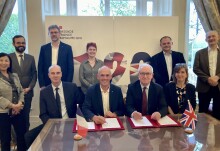

The Isaac Newton medal, the highest UK honour for physics, has been awarded posthumously to Professor Kibble for his outstanding lifelong commitment.
Professor Tom Kibble, who died last month aged 83, has today been awarded the Isaac Newton medal by the Institute of Physics (IOP).
It is absolutely right that he should receive our highest award, the Isaac Newton Medal, in recognition of his contributions to mankind.
– Roy Sambles
IOP President
Professor Kibble paved the way for some of the greatest discoveries within physics. His work reshaped the landscape of theoretical physics and catalysed the development of astroparticle physics.
One of his most famous contributions is his proposal of the Higgs mechanism - the way in which particles acquire mass. His seminal paper that first introduced the concept of the Higgs mechanism was recently heralded by Physical Review Letters as one of the most important research papers of the last 50 years.
His friend and former colleague Professor Sir Peter Knight of Imperial College London and a former IOP President believes that Professor Kibble made the most important contribution to the development of our understanding of how the Higgs mechanism operates.
"He was someone who did not follow fashion. He really felt that it was important to get to the heart of problems in a systematic way. It was Tom's vision and insights that led to a deeper understanding of the Higgs mechanism and connected it with the Standard Model and it led to so many other things in physics."
contributions to mankind
President of the IOP, Professor Roy Sambles, said of Kibble receiving the Newton award: “As one of the key theoretical physicists in the UK in the twentieth century Professor Kibble was held in very high esteem by the UK and worldwide physics community.
"It is absolutely right that he should receive our highest award, the Isaac Newton Medal, in recognition of his contributions to mankind through his insight into the origins of mass and also through establishing astroparticle physics as a new branch of physics.
The Isaac Newton medal is awarded to individuals who have made significant contributions to physics in their lifetime, and previous recipients have included Sir John Pendry, also of Imperial’s Department of Physics.
More medals
The IOP awards a number of medals each year to physicists who are exceptional in their field of research, industry, education or outreach.
Alongside the Newton award, Professor Jenny Nelson from Imperial’s Department of Physics was honoured this year with the Faraday Medal for ‘her pioneering advances in the science of nanostructured and molecular semiconductor materials’.
Sambles said that Professor Nelson’s influence in her field was exceptional. "She has driven progression in solar cell development... and she appears set to shape the advancement of these renewable energy sources for years to come," he said.
Article text (excluding photos or graphics) available under an Attribution-NonCommercial-ShareAlike Creative Commons license.
Photos and graphics subject to third party copyright used with permission or © Imperial College London.
Reporter
Hayley Dunning
Communications Division

Contact details
Tel: +44 (0)20 7594 2412
Email: h.dunning@imperial.ac.uk
Show all stories by this author
Leave a comment
Your comment may be published, displaying your name as you provide it, unless you request otherwise. Your contact details will never be published.




Comments
Comments are loading...